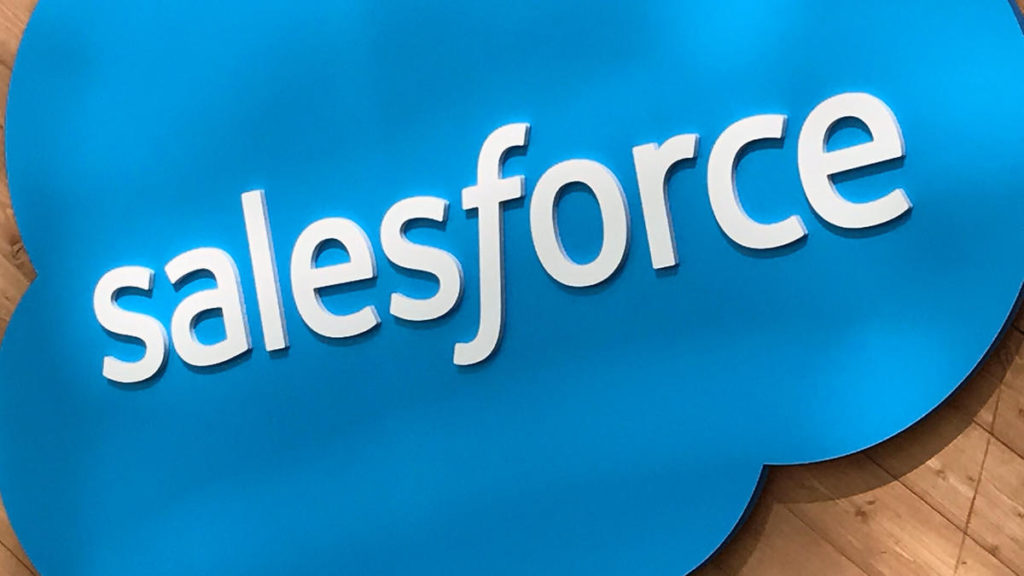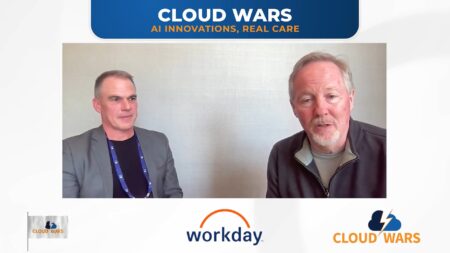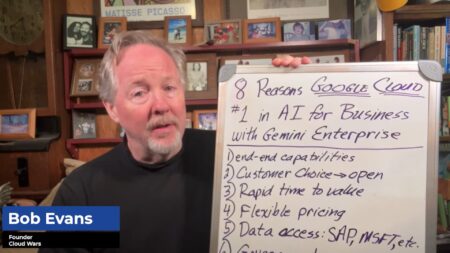(Editor’s note: This article by Jiri Kram was originally published on LinkedIn on Aug. 30. Jiri has published several articles here at Cloud Wars over the past six months, and as with all of his other insightful and compelling pieces, this article reflects Jiri’s informed views and does not necessarily reflect the views of Cloud Wars. In this specific piece, Jiri looks at the recent extraordinary performance of Salesforce and speculates on the future arc of Marc Benioff’s company. A solution architect who studied FinTech at MIT and has a particular emphasis on ML and blockchain, Jiri has worked with Salesforce technology for many years.)
The answer is maybe. Why? Salesforce is the only remaining outside disruptor to Apple-Amazon-Microsoft-Google world’s dominance. Everyone else is out of the race; Oracle, IBM, SAP, HP, Dell, etc., Salesforce is the last man standing.
The new world paradigm
Let’s imagine the world in 12 months. Do you believe the current state of affairs where a significant amount of value is trapped in assets like real estate, travel, hospitality, retail and so on, can last forever? Are the businesses dependent on human interaction to produce money viable in times of pandemic? The world is quickly moving to digital services delivered without physical human-to-human interactions. There is also an increasing trend of replacing humans with AI. Why? AI doesn’t transmit human diseases. Companies that will thrive in this new world are those that don’t need physical human-to-human contact to generate revenue. Salesforce is no doubt a perfect fit for this brave new world.
Think about it. Who is winning, and why?
Apple
The device is the gateway to services. Apple controls the device and is de-facto gatekeeper for what services can be delivered. The strange thing about Apple, they are controlling devices, by love, not fear. Apple designs the most beautiful machines that people love to use and that ultimately become status symbols. So it’s increasingly difficult to change people’s habits and switch their lives to another device and platform. Apple is aware of this, and as long their engineers will continue to delight customers with new experiences and perfection, it will be hard for someone to lure those customers elsewhere. Apple is an addiction; it’s a lifestyle choice, not just a device. So, as long people will enjoy buying luxury technology items, Apple will likely be on the top of the consumer mind.
Microsoft
Some people don’t like Apple, and others don’t want to pay the premium. Microsoft is aware of it, so they re-designed Windows 10 working perfectly and effortlessly with Azure-based services. Another important fact, Microsoft, unlike Apple, is an open hardware ecosystem meaning it works with devices from many vendors. Windows is also much more widespread among the population of the world than Apple OS. The reason is the price, and Apple is a premium brand and closely guarded ecosystem. If Apple is about artistic perfection and simplicity, Microsoft is about productivity. Office 365 is an essential application that runs on both Microsoft and Apple. As long Microsoft will keep expanding Azure services and improving Windows and Office 365, they again will be still on many customer’s spending lists.
Amazon
Jeff Bezos’s empire is the force not to underestimate. Amazon is like a combination of both Apple and Microsoft multiplied. What Amazon do differently is an obsessive focus on the customer. Apple is focusing on perfection and simplicity and Microsoft on productivity; Amazon main goal is to deliver everything that customer needs. Look at AWS, what is it? It’s an IT supermarket. You go there and get anything you need to build your apps, secure your network, just to experiment or anything else your IT needs. Bezos took the same philosophy he used to build the bookstore and started selling another product category – IT services. What is remarkable, Amazon realised the best margin could be achieved, making its own B2C products (store, Prime, Alexa, etc) running on their own infrastructure that is then packaged as AWS services and sold to B2B customers. The result is that customers are de-facto paying Amazon their B2C infrastructure by paying for B2B services (AWS), which is a genius concept. Only Microsoft so far succeeded is in similar B2C (Windows and Office 365) / B2B (Azure) combo.
What you do when you need to find something? Yes, you Google it! There are certainly other search engines but if you are like the majority of people, all you do is type whatever you need to find into your browser and let Google do the heavy lifting. Microsoft is aware of it—that’s why you have seen Bing integrated into the Windows browser. Microsoft also painfully remembers how Bill Gates in 1998 was standing in front of an anti-trust committee when the browser becomes too close to the operating system. Nadella is well aware of it and so he’s not too keen to join Bezos, Pichai, Cook and Zuckerberg in hearings. So, 22 years later, all is silent, and no one is complaining about Google Chrome, and Android uses Google search. Google also benefits that Android counterbalances the worldwide dominance of Apple and Microsoft. That’s very similar to how Amazon and Microsoft realised they could let the customer pay for running their infrastructure by building and packaging their own IT components and sell as Google Cloud. The same as in the case of Microsoft and Amazon, the blend between B2C and B2B strategy is paying off.
And…
Here comes Salesforce
What is Salesforce? In essence, it allows companies to sell, service, market, and connect with customers, partners and employees. In times like these, when many companies are at risk of being destroyed by pandemic, speed is of an essence. And if Marc Benioff is master in something it’s in speed how fast he can deliver solutions to the clients). He is a relationship guy who knows that for Salesforce to be successful his company name must be on the mind of any CEO that needs to: 1) sell, 2) service, 3) market, 4) connect with new and existing customers, partners and employees. The power of focus. Salesforce is as simple and creative as Apple, reliable as Microsoft, customer-obsessed as Amazon and with a deep engineering skill like Google. Besides, the same as Apple, Salesforce has a massive fan base that further evangelises Benioff’s religion around the globe, either for free or via some swag (hoodies, stickers for the laptop or virtual badges, etc).
What stands in the way for Salesforce to become a trillion-dollar company?
The simple answer is $750 billion. In a way, though, this amount is almost unimportant because what will ultimately determine if Salesforce will become a trillion-dollar company are the following roadblocks and accelerators:
Amazon
If the US Congress will force Amazon to spin off Amazon Web Services, then the next logical thing is the merger between Salesforce and AWS. Why? There is a historical precedent: in 1982, AT&T was broken up to smaller companies that became even more powerful and acquisitive than original AT&T. If Amazon is broken up, then AWS will likely merge with Salesforce creating a trillion-dollar play from the get-go.
Microsoft
Satya Nadella is well aware of the danger posed by combined AWS + Salesforce. He is also mindful that if he were to attempt to take over Salesforce, the result would be so costly to Microsoft that it would likely upset share price. Salesforce was for a long time relatively undervalued, but now with the inclusion of Dow Jones Industrial index, the prospect of Microsoft attempting such a merger is getting blurry. Not even Nadella would have an appetite for a $300-billion takeover (which would be one of, if not the, largest in history). Plus it would be hard to explain to shareholders why Microsoft didn’t buy Salesforce for $70 billion in 2015, and now paying $230 billion more just 5 years later!
The other player that could acquire Salesforce is Google Cloud via the vision of CEO Thomas Kurian. The only problem is it would require Kurian to justify spending $300 billion for a single company to Sundar Pichai and Google’s board. Which is unlikely, as Google trying to make a M&A of this size could indeed bring the attention of the antitrust committee that would instantly use it as an example of growing power Google that could lead to a breakup. So this move is unlikely.
Apple
So why not Apple? Can they do it? Certainly. The problem is why. Because it’s unlikely that there would be many benefits for Apple in attracting the attention of the antitrust committee by using $300 billion to acquire something that could increase their dominance. Therefore, this route is also unlikely.
Others
In my previous article, I mentioned a few other contenders: IBM and Oracle. But this thought is no longer relevant, and the $300-billion acquisition would be way off what shareholders would be able to stomach even as LBO.
Conclusion
As you can see, there is nothing in the way for Salesforce becoming the next trillion-dollar company. The question is not if this will happen but how fast.
(Author’s disclosure: I am long CRM, MSFT, AMZN and AAPL. I wrote this article myself, and it expresses my own opinions. I am not receiving compensation for it.)
(Additional disclosure: The information contained herein is for informational purposes only. Nothing in this article should be taken as a solicitation to purchase or sell securities. Before buying or selling any stock you should do your own research and reach your own conclusion or consult a financial advisor. Investing includes risks, including loss of principal.)
RECOMMENDED READING
Also by Jiri Kram:
Can Salesforce Keep Growing? 5 Possibilities for Marc Benioff
Plus more Cloud Wars coverage of Salesforce from Bob Evans:
How Salesforce Plans to Beat Oracle and SAP While Scaling to $35 Billion
Marc Benioff: The Extraordinary Ascendancy of a Global Leader
Best Software Acquisition of All Time Was Salesforce Buying Tableau: Marc Benioff
As Salesforce Blows By SAP and Oracle, Cloud Wars Top 10 Market Cap Hits $5.66 Trillion
Salesforce Beats SAP, Oracle, Microsoft, Adobe—Combined!—in 2019 CRM Share
Cloud Wars: Why Microsoft Is #1, Amazon #2, Salesforce #3, Google #4
Salesforce Shocker: Its #1 Revenue Business Is “Platform and Other”
Marc Benioff Delivers: “The Best I’ve Ever Seen Salesforce Perform”
Subscribe to the Cloud Wars Newsletter for in-depth analysis of the major cloud vendors from the perspective of business customers. It’s free, it’s exclusive and it’s great!






